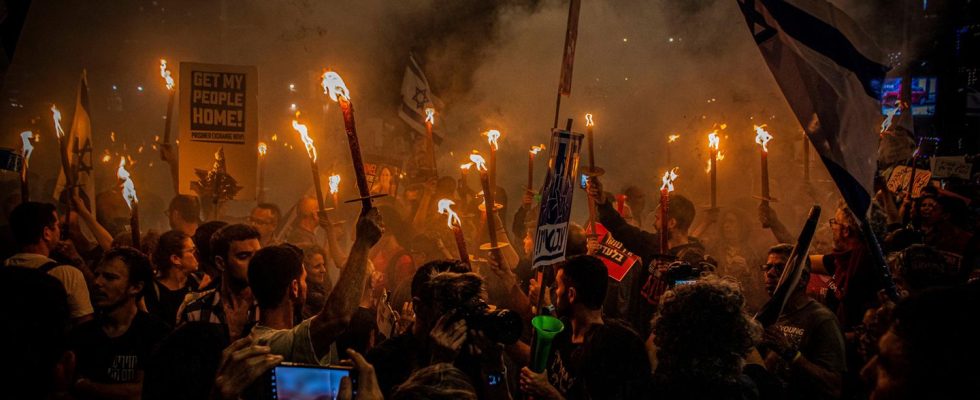Netanyahu under pressure
The war stifled the protests in Israel – now they are flaring up again
Israelis on the barricades: There have been demonstrations against Prime Minister Benjamin Netanyahu in Tel Aviv and other cities for several days
© Eyal Warshavsky / Imago Images
A country at war begins to revolt against the Prime Minister. New protests are flaring up in Israel these days. Various groups come together, but there is hardly a unified goal. Benjamin Netanyahu should still be afraid.
Why are there demonstrations in Israel?
“When you go to a demonstration and you can’t say exactly why because there are so many reasons to protest – that’s the situation in Israel,” says Israeli war photographer Kobi Wolf star. “There is a lot of anger in this country.” For the fourth day in a row, thousands of Israelis were on the streets in Tel Aviv, Jerusalem and Haifa on Tuesday. The anger is erupting – against the government and the war led by Benjamin Netanyahu.
Some are calling for new elections and Netanyahu’s resignation. Others are calling for an immediate deal with Hamas to bring the hostages remaining in the Gaza Strip to Israel. In an initial agreement in November, around 100 hostages were released. Another 100 hostages are estimated to be alive and still in the hands of the terrorist organization.
Who is taking to the streets?
In short: different groups with different goals. Government critics who protested last year against the judicial reform, which has now been put on hold, are now back on the streets.
Some of the hostage relatives who have been worried about friends and family in captivity for six months have united with these critics. These are among the prime minister’s harshest critics. Einav Zangauker’s son Matan remains held in the Gaza Strip. She therefore took part in the demonstration and told the British “Guardian” in the direction of Netanyahu: “If we don’t act immediately to take the wheel away from you, we will not see our loved ones return home alive and quickly,” said Zangauker on Sunday. “And we will not see our dead returned to Israel for burial.”
But the families are divided, says Kobi Wolf star. “Some of the hostage relatives are joining the anti-government protests. Others prefer to keep their feet still and want to let the government do its job so as not to jeopardize a possible deal.”
At the same time, ultra-Orthodox Jews are on the streets. They were exempt from compulsory military service for decades until the Supreme Court overturned this practice last year. However, the right-wing conservative government was unable to pass these exceptions into law. Ultra-Orthodox men of military age have therefore been able to be drafted since April 1st. According to media reports, there are more than 60,000 men.
Region in turmoil
Who is on whose side in the Middle East?
Why do so many people carry Israeli flags with them?
For the sake of unity – and because of the attempt to distance themselves from the government. After criticism was rarely expressed in Israel in the first months of the war, the sense of unity is changing. As outside Israel, there are divided opinions here on negotiations with Hamas, the war in Gaza and the treatment of the Palestinian population. The demonstrators are now making this visible.
“We held back for six months,” Michal Begin, a doctor from Jerusalem, told the New York Times over the weekend. “Initially we felt that we had to stick together for the sake of the war effort.” That has changed, says Begin: “Our need to mobilize for the intensive war effort has diminished. Now we can say that this government can no longer serve.”
In January, the war photographer Kobi Wolf also moved to the star a bitter interim assessment: “This war is driving our country apart. Israel has already lost it, no matter how many Hamas terrorists die.”
There are violent images of the protests, is the situation (still) peaceful?
Not everywhere. In Jerusalem, demonstrators set up around 100 tents in front of the Knesset, Israel’s parliament. Many protested peacefully on Tuesday for the fourth evening in a row, some with torches in their hands. According to Israeli media, some protesters also gathered in front of Netanyahu’s private home and broke through the police barriers. In a statement, police said there was “tumult,” there were five arrests and one officer was injured. The police used water cannons against the demonstrators. Media also reported that emergency services violently dispersed some demonstrators.
The oppositionist Benny Gantz also criticized the aggressive actions of the demonstrators. “A protest is legitimate, the pain is also understandable,” Gantz wrote on Wednesday morning X, formerly Twitter. “But the law and the rules of the game must be respected.”
What does Benjamin Netanyahu say about the protests?
The families of the hostages in particular accuse the Prime Minister of putting his retention of political power above the lives of the remaining hostages. Some of them are calling for new elections.
Benjamin Netanyahu rejects this criticism. He recently said that he was obliged to bring all the hostages home. A new election would paralyze negotiations over the release of more hostages and “bring about an end to the war before the goals are achieved,” said Netanyahu. Israel wants to destroy the Islamist Hamas in the Gaza Strip.
However, the head of government’s popularity ratings are in the basement. A survey by the Israel Democracy Institute (IDI) in January showed that only 15 percent of Israelis were in favor of Netanyahu remaining in office after the end of the war. The criticism from the right is also extremely inconvenient. Observers repeatedly say: Of all people, the right could ultimately bring down the right-wing conservative Netanyahu.
Further sources: “New York Times“, CNN“The Times of Israel“, Reuterswith information from the DPA


